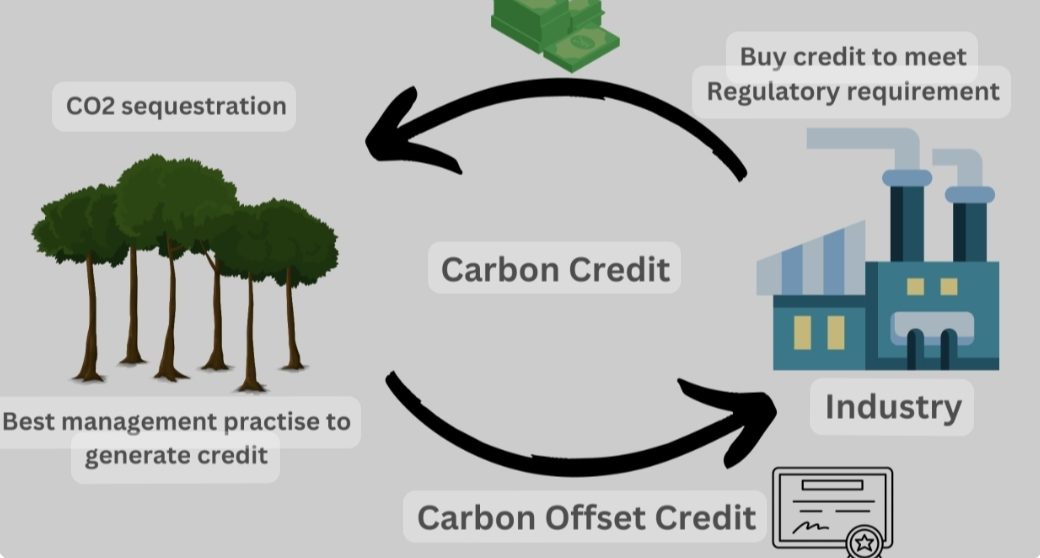“With a minimum price of 10 USD/ton, participating in the carbon credit market in the period 2022-2026, 4.26 million hectares of forests in the Central Highlands and South Central we can earn 1,200 billion VND” Dr. Le Xuan Nghia – member of the National Financial and Monetary Policy Advisory Council, Director of the Business Institute Development (BID) affirmed.
The world has been forming a carbon credit and Vietnamese businesses cannot stand aside if we want to export to the US and Europe. Vietnamese businesses can take advantage of their own strengths to invest in this new field, including KTS Group.

Look at the world
On May 10, 2023, the European Commission’s EU Carbon Border Adjustment Mechanism (CBAM) officially be valid. During the transition period from October 1, 2023 to December 31, 2025, importers with reporting obligations under the provisions of Articles 33, 34 and 35 of Regulation (EU) 2023/956 must report at the end of each quarter the emissions recorded in CBAM goods (though not yet have to pay the adjustment costs), allowing time for system improvement. Starting in 2026 the EU will put a carbon price on all imports.
The US market has issued a mechanism to impose carbon taxes on importers by 2024. For cement, iron, steel, aluminum, fertilizer, electricity and hydrogen products, importers must report this information quarterly for each product with each supplier and will be penalized if non-compliance.
The company Ampaire headquartered in Hawthorne, California has just successfully tested the first hybrid electric aircraft in the world, which carrying 9 passengers, traveling 1,000 km and especially reducing carbon emissions by 70% compared to aircraft using regular fuel. Every year, aviation industry
around the world release about 1 billion tons of carbon emissions into the environment, accounting for 3% of global emissions, a large number that is considered the cause of climate change.
First season of sweet fruit
In 2023, Vietnam received more than 41 million USD from the World Bank to pay for the “forest households” in six North Central provinces thanks to the purchase of carbon credits from forests. Moreover, it has basically completed the commitment contract to reduce 10.3 million tons of carbon emissions from the 6 provinces mentioned above by 2025. According to the commitment, Vietnam will receive a total of 51.5 million USD if the contract is completed so one credit carbon will be purchased for $5 USD (1 credit equal 1 ton of CO2).
Vietnam’s completion of its commitment 2 years in advance has opened up the carbon credit market with many conditions for development. Vietnam has benefited from the early fruits of the season, although the road ahead still has many difficulties that need to be resolved in terms of mechanisms, policies as well as specific and detailed issues.
Dr. Le Xuan Nghia, Director of BID said: “To reduce greenhouse gas emissions, organizations and companies related to the fields of energy waste management, transportation, agriculture,… need to join hands. However, in the short-term goal, the forestry sector plays a very important role in achieving the goal of forest carbon absorption, creating a balance with emission reduction.
More than anyone else, local people in Quang Nam, the first place approved by the Prime Minister to set up a pilot project for carbon credit business, which earning over 120 billion VND/year. There are 680,000 hectares of forest, (coverage reaches 58.6%) including 466,113 hectares of natural forest, with the ability to absorb more than 11.2 million tons of carbon gas in the period 2018-2025, this locality will create generated 6.1 million carbon credits. Currently, there are at least 5 foreign companies registered to buy forest carbon licenses/credits from this locality.
Dr. Le Xuan Nghia shared: “BID Institute is managing more than 500 hectares of natural forest in Ha Tinh. Four years ago, German experts measured the carbon index according to international standards and gave a result of 195 tons of carbon/ha. If we put carbon certificates on the stock exchange, we will earn at least 800,000 USD, much larger than the amount of 300,000 VND/hectare for forest manager that local people are currently receving”.
KTS join market
The domestic carbon market is in the formation stage, in early 2022, the Prime Minister issued Decree 06/2022/ND-CP regulating the pilot implementation of a carbon credit trading floor from 2025 and 2028. The domestic carbon market has just officially been formed, which has the ability to connect to the world market.
Vietnam currently has over 14.7 million hectares of forest with a coverage rate of 42.02%, of which natural forests account for more than 10 million hectares, planted forests account for more than 4.5 million hectares. If divided by useing purpose, special-use forests account for more than 2.1 million hectares, of which 94,940 hectares are planted forests, protection forests cover more than 4.6 million hectares, of which 626,124 hectares are planted forests. Production forests are over 7.8 million hectares, of which more than 3.8 million hectares are planted forests (Ministry of Agriculture and Rural Development, 2022).
Currently, foreign investors are quite picky about purchasing credits from planted forests, because in addition to the longevity of the trees, the vegetation cover is less than of natural forests. That can make the carbon absorption of planted forests is less while the highest is the Acacia forests, producing about 93 tons of carbon/ha.
Therefore, Vietnam needs to gradually convert planted forests into primary forests to create a richer carbon source, something that only people will find it difficult to do due to limited capital and management ability.
Currently, KTS Group is researching to accompany and support people to develop carbon credit market. Many applications of forest management technology such as fire alarm, automatic fertilization, and irrigation water will be deployed by KTS Group. Mr. Hoang Van Ngoc – Chairman of KTS Group affirmed: “The potential of Vietnam’s forests is 50 – 70 million tons of carbon credits, which can be sold for thousands of billions of dong. Forests are a “carbon storage” but to become a trade commodity we need to add more regulations. Who will the carbon belong to, just the forest owner or many other subjects?”. Dr. Le Xuan Nghia will act as an advisor to KTS to develop this field.
An Thanh

